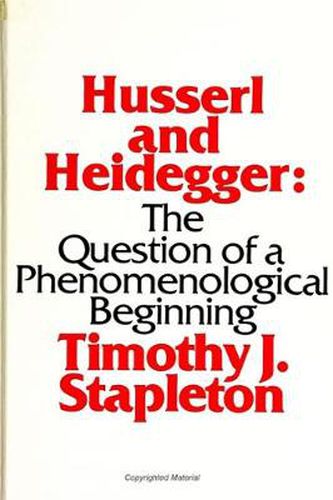Readings Newsletter
Become a Readings Member to make your shopping experience even easier.
Sign in or sign up for free!
You’re not far away from qualifying for FREE standard shipping within Australia
You’ve qualified for FREE standard shipping within Australia
The cart is loading…






The phenomenology of Edmund Husserl has decisively influenced much of contemporary philosophy. Yet Husserl’s philosophy has come under such criticism that today it is viewed as little more than a historical relic. One of the most important and influential critiques of Husserl’s transcendental phenomenology was launched by Martin Heidegger in Being and Time, which radically reinterpreted phenomenology. Timothy Stapleton returns to the origin of phenomenology to provide a clear, concise perspective on where it has been and on where it ought to be heading. This book is a careful reexamination of the internal development of Husserl’s thought as well as of the ways in which Heidegger used and transformed the phenomenological method. It begins with an interpretation of the transcendental dimension of Husserl’s philosophy, stressing the importance of the ontological rather than the epistemological problematic in determining the unfolding of Husserlian thought. The work progresses to an account of Heidegger’s early works, viewed as a radicalization of Husserl’s phenomenology both in name and substance. Stapleton concludes by contrasting a transcendental origin with a hermeneutic beginning point in terms of their respective ideals of intelligibility, meaning, and being; and then looks at some of the consequences of the idea of a hermeneutic philosophy.
$9.00 standard shipping within Australia
FREE standard shipping within Australia for orders over $100.00
Express & International shipping calculated at checkout
The phenomenology of Edmund Husserl has decisively influenced much of contemporary philosophy. Yet Husserl’s philosophy has come under such criticism that today it is viewed as little more than a historical relic. One of the most important and influential critiques of Husserl’s transcendental phenomenology was launched by Martin Heidegger in Being and Time, which radically reinterpreted phenomenology. Timothy Stapleton returns to the origin of phenomenology to provide a clear, concise perspective on where it has been and on where it ought to be heading. This book is a careful reexamination of the internal development of Husserl’s thought as well as of the ways in which Heidegger used and transformed the phenomenological method. It begins with an interpretation of the transcendental dimension of Husserl’s philosophy, stressing the importance of the ontological rather than the epistemological problematic in determining the unfolding of Husserlian thought. The work progresses to an account of Heidegger’s early works, viewed as a radicalization of Husserl’s phenomenology both in name and substance. Stapleton concludes by contrasting a transcendental origin with a hermeneutic beginning point in terms of their respective ideals of intelligibility, meaning, and being; and then looks at some of the consequences of the idea of a hermeneutic philosophy.